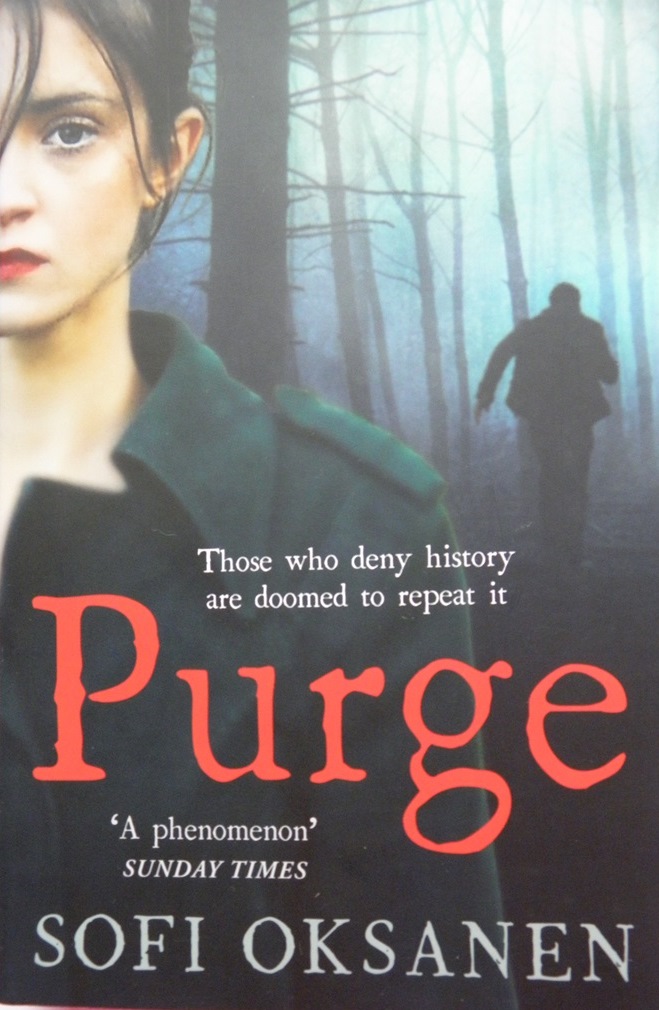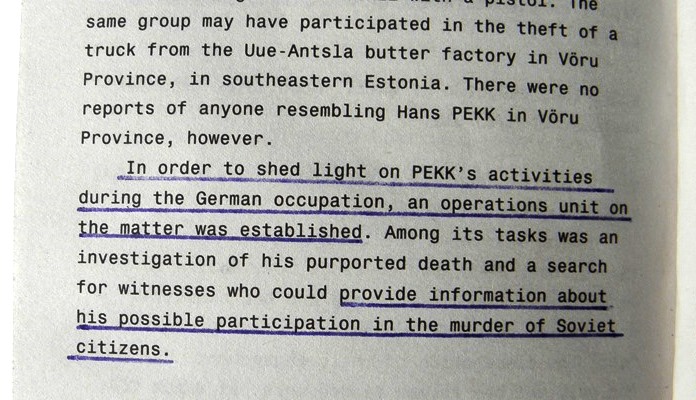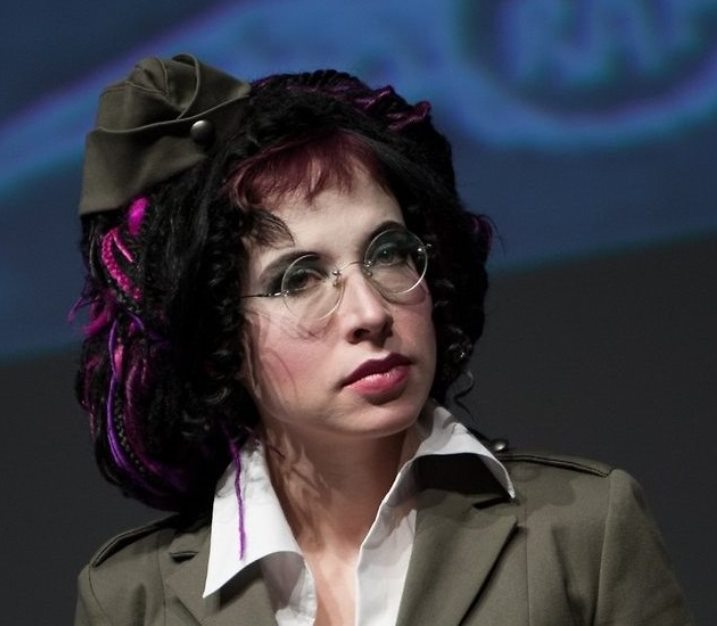B O O K S
by Leena Hietanen

The book’s moral is on the front cover: “Those who deny history are doomed to repeat it.” But the book itself virtually deletes the Holocaust from the region’s history…
The most famous Finnish contemporary author, Sofi Oksanen, now 36 years old, has made a fortune from her books about Estonian history that are in some ways conceptually steeped in the Double Genocide movement. According to the Finnish financial daily, Kauppalehti, the turnover of her publishing enterprise, Silberfeldt Co. reached 3.4 million euros with a net profit of 1.8 million euros since 2011, when she established the company.
The bestseller has been the novel, Purge, which phenomenally sold over 150,000 copies in Finland alone. The book has been translated into dozens of languages and has been quite a success in France and Scandinavia. The stage version (which is the original) of Purge came to New York (though still off-off Broadway). By Finnish standards her popularity and business skills have made Ms. Oksanen the “Harry Potter – Joanne Rowling” of Finland.
The author’s background is suitably bicultural. Her Estonian mother moved to Finland in 1970 to marry her Finnish father, who had been working in Soviet Estonia in the construction industry. Sofi was born in Finland in 1977. She has never lived in Estonia, neither Soviet nor post-Soviet Estonia, but that has not prevented her becoming also an acknowledged ostensible expert on Estonian history.
In the novel, Purge, the main male character, Hans Pekk, is an Estonian freedom fighter, a Forest Brother. The time and place of the narrative is post World War II Soviet Estonia in the years 1944-1992. Oksanen, to be clear and fair, has never denied his history as a Nazi collaborator. What she does do is purge (no pun intended) the Nazi past of the hero. In the last pages of the book she reveals a KGB interrogation document, which tells readers that there was an operational unit established to search the activities of Hans Pekk during the Nazi occupation 1941 to 1944. So much for the Holocaust in Estonia! The rest is to concentrate on the Holo-train (my term) meaning the deportations to Siberia (which are declared in effect “equal” to the Holocaust by Euro-documents such as the 2008 Prague Declaration).

The book’s single paragraph that touches upon a hero’s earlier collaboration with the Nazis…
Those familiar with Estonian history know that Estonia was the first “Judenfrei” country in Europe, by January 1942. Estonian collaborators and partners of the Nazis were enthusiastic killers to the point that Nazi Germany outsourced the killing of other European Jews to them and selected other countries. About 10,000 Jews was transported to be executed on Estonian soil by the collaborators. Men like Hans Pekk, who had been a member of the fascist organization called Omakaitse that had taken part in murdering (real or alleged) Communists, would have in most cases also been a Jew killer in 1941.
What most people do not know is that Estonians who were deported to Siberia in most cases did return to Estonia. In 1949 about 20,000 Estonians were deported to Siberia. After Stalin’s death in 1953 most of them were returned to Estonia. Those who didn’t had by and large settled down in Siberia in Estonian villages. The death rate was of course higher than in good times and places, but people were not killed for being Estonians or Balts.
A State Sponsored Industry?
In a civilized world, the omission of the Nazi genocide right on ground zero of the 1941 “Holocaust by Bullets” would have at least led to major discussion about the motivation and effects of the omission. The discussion would even be part of the book’s success! But in the Baltics Purge became the greatest hit and most read export of Finnish literature of all times with virtually no discussion of its historical or ideological orientation.
Oksanen has enjoyed generous support from both the Estonian and the Finnish state. She has received the highest awards in both countries. The Estonian Foreign ministry has taken the novel Purge as an official state gift for foreign head of states who come to visit Estonia. Finland for its part has been organizing promotions for the book and the play in Finnish embassies around the world. The free liquor flows.

Author Sofi Oksanen
Purge, first published as a play, had its premiere at the Finnish National Theatre in 2007. Oksanen had a good mentor helping her to get the play in order, Mr. Mika Myllyaho, her teacher at the Theatre Academy. He has confessed publicly that it took a lot of work to get some structure and drama into the play. After the success on the stage the biggest publisher in Scandinavia, WSOY, got interested to get it published as a novel.
A heavyweight editor, Harri Haanpää, took the job of converting the play into a novel. In the opinion of some, this was among other things the case of an ex-Communist with a magnificent opportunity to wash his hands of his own past. The contributions of all the players, of politically charged dabblers in history and other mentors to the soup finally cooked up may never be fully known, but it is an intriguing topic. What is clear is that a Baltic ultranationalist effort in the spirit of Double Genocide is powerfully in play. That “spirit” of Double Genocide as actually played out nowadays invariably results in deleting, diminishing or trivializing the major part of the history of actual genocide by the Nazis and their East European (especially Baltic) nationalist comrades. The answer is a massive Holo-hoax that transfers the genocide to the wished-for culprit while in effect exonerating the actual killers of the actual genocide. This exoneration is typically accomplished by ignoring the Holocaust-era deeds of a collaborator and turning him into a postwar anti-Soviet hero based on later participation in Forest Brother type activity.
The novel came out in 2008. It was immediately awarded the Finlandia Prize. Since then its success abroad has been breathtaking. It has got the Nordic Literature Prize, two awards in France and most recently, the “petit” Nobel Prize, the Swedish Academy’s Nordic Prize for 2013. Her conflicts with colleagues and editors have themselves become sensations of which the media cannot soak up enough.
The Geopolitical Imperative
The success of Purge is so phenomenal that it is safe to say it will do Finland, Estonia, and the author no harm at all if there is open discussion about the Double Genocide aspect and its interaction with state-sponsored success. Without taking anything away from the author or anyone else.
First, Finland and Estonia. The new generation in Finland has as little knowledge of the actual Soviet Union (even its final decades, say from Brezhniev through Gorbachov), as the author Sofi Oksanen herself. In Finland there is a need for a new narrative which justifies for the West European ethos the continued (and frankly un-European) denial of Estonian citizenship to some two hundred thousand Russian speakers who lack citizenship and equal rights in Estonia. Estonian political leaders naturally fall head over heels for Oksanen’s Purge. It deflects attention from the eager nationalist participation in the Holocaust in the Baltics as well as from today’s unequal Estonian non-citizenship.
Swedes are generally very sensitive when it comes to human rights but Russia is for them a kind of black hole. Sweden has used the Baltic states geopolitically as a buffer zone against Russia. So this time also. Swedes tend to automatically reward everything that is anti-Soviet, anti-Russian, and of course anti-Communist, overlooking the standards they might otherwise demand at the exquisite levels of literary and commercial success.
And the French are far away. They often know nothing of the Baltics’ past or present. Oksanen’s Holo-hoax provides a good opportunity to the French right to smear the left. The French Communist party used to be very strong in France and the leftist intellectuals, like Jean Paul Sartre, were world famous. They were not war criminals and they did not a little for French culture.
In the Anglo-Saxon world the Baltic states are minor details. Nowadays, as long as things are anti-Russian, everything goes, even to whitewash the Holocaust.
The novel Purge is typical Holo-hoax literature. Nationalists round the world are absurdly envying the Jews their actual history in the Holocaust (genocide), and equally absurdly, they are aping both the the academic and popular constructs and terminology of the Holocaust for all sorts of different crimes by others, that certainly need to be investigated and remembered, but that do not by any stretch of the imagination constitute the equal of murdering all who belong to a group by race or religion.
In Ukraine there is the Holodomor, where the holod part comes from a Slavic root for “hunger” but whose popularity rests upon its homophony with the holo in Holocaust. In the Baltics, it is the Holo-trains which are meant to equal (more and more to replace) the real death trains to Auschwitz and Treblinka in the consciousness of younger and future generations. There is a macabre competition of sufferings.
Knowledge of the Baltic Holocaust is scant even in nearby Finland. It is not known that Estonia was the first “Judenfrei” country in Europe, that all three Baltic countries had the highest kill-rate of their Jewish population of any countries in wartime Europe, or that Estonia and others provided such a superb home for Nazi concentration camps and murder sites for Jews from other European countries.
There is a campaign to trivialize and diminish the Holocaust while building a sense of Finno-Estonian linguistically-related cousinship on the basis of a Russian genocide of Estonians that just did not happen, with no diminution of the seriousness of so many other real crimes.
Come to think of it, it would make very good sense for both Finland and Estonia, for the Estonian (and Latvian and Lithuanian) Holocaust to be studied in some greater detail in Finland, given the proximity of space and the efforts being poured into a bogus history constructed by the elites of the new far right that spans everything from declarations by members of the European Parliament all the way to runaway bestseller historical novels.